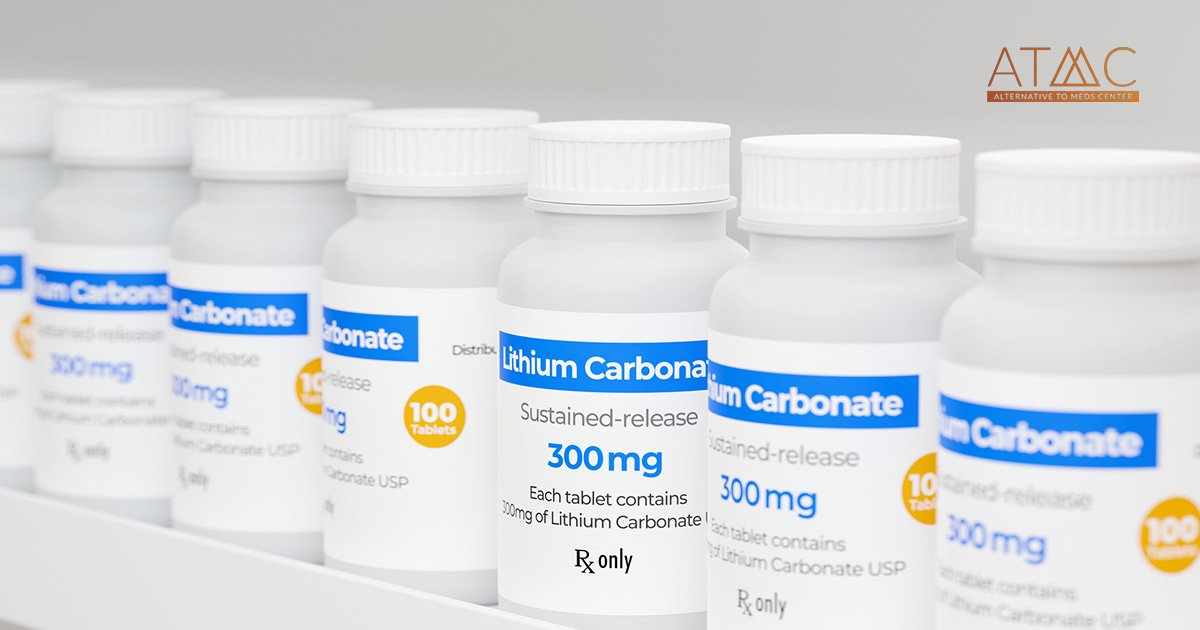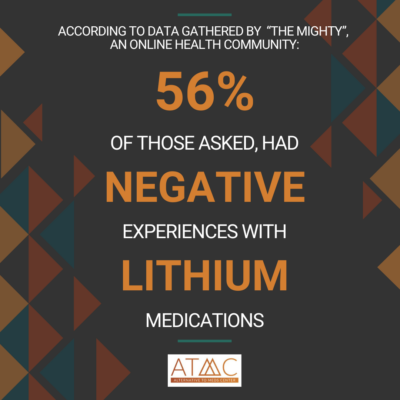Last Updated on September 30, 2023 by

Alternative to Meds Editorial Team
Medically Reviewed by Dr Samuel Lee MD
Last Updated on September 30, 2023 by

Alternative to Meds Editorial Team
Medically Reviewed by Dr Samuel Lee MD
Lithium, in its elemental state, is a soft alkali metal allegedly first discovered on a Swedish island, then in mines located in Australia and Chile in 1817. While the element wasn’t isolated until 1855, researchers immediately began to discover uses for the world’s softest, lightest metal.
It wouldn’t be until the late 1800s that certain lithium compounds, known as lithium salts, would be used as a medical option. Lithium carbonate, a compound composed of two lithium atoms and three oxygen atoms, was originally used to treat mania. By 1949, Australian psychiatrist John Cade had published a paper on the use of lithium carbonate to treat acute mania. From that point on, lithium carbonate – now simply referred to as lithium – would be increasingly prescribed for an increasing range of mood disorders. In the US, lithium was approved by the FDA in 1970.1
Often, vitamins and mineral compounds are prescribed to deal with some sort of deficiency. As a result, since lithium is a naturally occurring element, there is a misconception that it works by restoring a lithium balance. However, mood disorders are not caused by a lithium deficiency.
Instead, lithium appears to react with neurotransmitters in the brain to provide an effect that can act as a mood stabilizer. Like other medications prescribed to address mental health conditions, medical science still lacks a clear understanding of why or how lithium completes this interaction. What we do know is that lithium interacts in some way with neurotransmitters, neuron receptors, and chemical systems in brain cells.
Because of its noted effects on the brain, lithium has been used to treat a variety of mood disorders, such as bipolar disorder, major depression, and schizoaffective disorder. Other lithium salts, including lithium citrate, are sometimes prescribed in low doses to address ADHD. Scientists are also studying lithium’s potential use for preventing cell death in conditions such as Alzheimer’s, Parkinson’s, and Huntington’s disease.2
Scientists and researchers are still not positive about why lithium interacts with the brain the way it does or the long-term effects of those interactions. In part, this is because the brain and the way it communicates continues to surprise and amaze us. However, thanks to advancements in science that allow us to isolate neurotransmitters, we are slowly beginning to understand a critical portion of the process.
Neurotransmitters, hormones that act to relay messages within the nervous system, are contained at the end of one neuron. An electrical impulse travels along the nerve, releasing neurotransmitters into the space between the neurons. Some bind to the next receptor, which creates another electrical impulse. Neurotransmitters that don’t bind are essentially recycled to be used again by the original neuron.3
There are several different types of neurotransmitters in the brain. These include:
It is believed that lithium interacts with these neurotransmitters in complex ways, perhaps by altering or augmenting the way they release in the brain. As the pervasive “chemical imbalance” theory of mental health and mood goes, when a person is dealing with a mood disorder, they may be experiencing an imbalance of these neurotransmitters within the brain. Thus, theoretically, adjusting the production of any type of neurotransmitter can impact mood.
It is important to note that this theory remains a theory. It is, in fact, one of many theories regarding the way mental health truly works. But, since its inception in the 1950s and 60s, the chemical imbalance theory has been widely distributed by the media and the general public, likely because it’s comforting to believe that just as we can treat the cause of a calcium deficiency with more calcium, we can treat a serotonin imbalance with chemicals that result in more serotonin.
However, despite the fact that it led to the creation of a vast number of psychotropic drugs like selective serotonin reuptake inhibitors (SSRIs), serotonin and norepinephrine reuptake inhibitors (SNRIs), and even lithium, it is no more accepted by the psychiatry community than any of the others. Worse, this theory has led to the overprescription of psychotropic medications whose side effects may eventually exacerbate the original mental health condition.4
Like most other medications on the market, lithium comes with a long list of potential side effects and health risks. In fact, lithium has one of the most well-documented sets of side effects of all psychotropic medications.
These are just a few of the many potential side effects a person can experience when using lithium to treat their mood disorder. Some of these side effects can be severe and life-threatening, which has resulted in a decrease in lithium prescriptions. It is important that anyone considering this form of medication consider these side effects, including the risk of lithium toxicity. In most instances, it is recommended to try other, less dangerous methods first.5
There is little room for error when it comes to proper lithium dosages. For lithium to exert its effects on the brain and nervous system, people must take a dose that is incrementally below the toxic dose. As a result, individuals must work closely with a medical professional to arrive at an acceptable dose.
Since each individual’s sensitivity is unknown, most doctors will start with a low dose and increase that amount after careful monitoring. Upon arriving at an accepted dose, it is crucial to take the medication as prescribed to prevent the risk of lithium toxicity. Missing a dose and taking it later, inadvertently taking too much lithium, and lithium accumulation over time can result in lithium toxicity.
Too much lithium can cause a serious health concern known as lithium toxicity. Also known as lithium overdose, there can be serious repercussions for taking too much lithium. While very few people intend to take too much lithium, it is not uncommon to reach lithium toxicity, first and foremost, because the right dosage of lithium can range from person to person, and it often takes a bit of trial and error to get the dose just right. Worse, the accepted therapeutic dose is just below the toxic dose, which is why this drug requires careful monitoring. The symptoms of lithium toxicity vary in severity depending on how much lithium is in the blood.6
Lithium toxicity has two main causes. The first is a depletion of water volume in the body, which can be caused by dehydration, kidney problems, vomiting, and other medications. This is why staying hydrated is vital when taking lithium, as the drug is not metabolized by the body and needs to be flushed. The other major cause of lithium toxicity is a dose that too closely matches the toxic dose.
While lithium toxicity can occur on an acute basis when you take too much at once, it is much more likely to happen on a chronic basis when you take too much over a long period of time. As mentioned, lithium is not excreted well by the body. It can build up in the kidneys, which are responsible for its removal, as well as the liver, blood, muscles, thyroid, and bones. Worse, it builds up in the brain, particularly in neurogenic regions responsible for creating new neurons.7
Side effects, especially lithium toxicity, can be life-threatening. In fact, one of the major issues with lithium is our inability to truly anticipate how someone will react to lithium treatment. Some people are more sensitive to lithium than others and can experience side effects at much lower doses. Others who can handle higher doses without side effects may eventually experience chronic lithium toxicity as their body accumulates lithium.
In addition to general sensitivity issues, there are also certain foods and beverages that can affect lithium concentrations in the body. Salt intake, caffeine intake, and consumption of alcohol can all cause issues with lithium concentrations. Lithium can also negatively interact with other medications like ibuprofen, acetaminophen, metronidazole, amlodipine, and other ACE inhibitors.8 Anyone that considers lithium as a treatment option needs to be aware of the numerous risks associated with regular use.
In addition to the potential side effects and toxicity risks, there is also a risk of experiencing lithium withdrawal. Abruptly stopping this medication can cause serious issues for your physical and mental health. Lithium withdrawal can cause heightened anxiety, increased suicidal risks, and a return of mania or other bipolar disorder symptoms. As a result, it is crucial that if a person believes lithium is not working or causing unwanted side effects, they must see a medical professional to safely taper away from lithium use.
Unfortunately, after the taper is complete, many physicians will simply prescribe other medications to offset side effects and replace lithium. In these circumstances, the opportunity for holistic detox and treatment options can be lost. Since many individuals don’t want to rely on the chemical manipulations achieved by prescription medications, this can leave people with mood disorders feeling powerless and lost.

The Mighty, an online health community, asked its members to share their experiences with lithium. According to their own data gathering, the community was roughly equally divided when it came to positive or negative experiences while using lithium. However, the negative experiences topped the positive at 56%.9
For many people using lithium, the negative side effects outweighed the few positive effects they experienced. For some, lithium provided relief from symptoms of mania. However, many found themselves unhappy with the way lithium would impact their daily life. Lithium caused issues with fine motor skills for many, including small tremors. For individuals who work with their hands or enjoy hobbies and activities that require precision, tremors were extremely disruptive.
While lithium is intended to stabilize mood, a major complaint is that this mechanism instead creates a sense of detachment. While lithium seemed to prevent the extreme emotional highs and lows associated with bipolar disorder, it also numbed most other emotional responses. Patients reported feeling like they were in a dull haze. Also, since lithium can also interact negatively with commonly used over-the-counter medications and requires consistent hydration, the drug created an immense inconvenience for many. The need to worry about medication interactions, lack of water, or too much salt in their diet simply wasn’t worth the potential positives that lithium can provide.
Aside from the side effects and interactions, a growing number of people simply do not want to live their lives dependent on a variety of medications. Josiah’s story mirrors a host of similar stories available online when it comes to the diagnosis and treatment of mood disorders. As a young man preparing for his college journey, Josiah had no desire to be dependent on the chemical interactions caused by a medication that could change who he was. By using alternative therapies, he found he could be himself, manage his health concerns, and live a happy, fulfilling life.
Living with a mood disorder can impact the way you interact with others as well as how you feel about yourself. Mood extremes can lead to dangerous thoughts and behaviors, including suicidal risks. No one should have to go through life trying to manage these symptoms alone. However, turning to prescription medications such as lithium is not the only answer. There are several other medications and therapies that can be used instead.
There are a variety of treatment options that can provide the same desired effects without the severe risks associated with lithium use. More specifically, there are several drug-free lithium alternatives that rely on an integrative approach to explore the underlying causes of associated mental health conditions.
Unfortunately, in a typical medical setting, the doctor is often hyper-focused on the scientific side of brain chemistry, largely ignoring the many other factors that contribute to mental health. However, mental health is a whole-person disorder in that it both affects and is influenced by many parts of the whole person. Integrative approaches consider the person as a whole, exploring genetic, biochemical, environmental, and personal factors. This approach considers the connection between the body and mind, exploring numerous methods a person can use to manage their mood disorder symptoms.
Lithium presents a significant risk of severe side effects, and can negatively interact with other medications, even commonly used over-the-counter medications. For many individuals, the potential risks simply aren’t worth it. Fortunately, there are several alternatives to lithium that can provide lasting relief for those with mood disorders.
Our compassionate staff has worked with numerous clients who have a history of lithium toxicity and have sought our help to find other ways to manage mood disorders. Whether you are looking to taper your use of lithium or want to explore your options for mental healthcare outside of harmful psychotropic drugs, our treatment for antipsychotic withdrawal can help.
1. Shorter E. (2009). The history of lithium therapy. Bipolar disorders, 11 Suppl 2(Suppl 2), 4–9. https://doi.org/10.1111/j.1399-5618.2009.00706.x
2. Haussmann, R., Noppes, F., Brandt, M. D., Bauer, M., & Donix, M. (2021). Minireview: Lithium: a therapeutic option in Alzheimer’s disease and its prodromal stages?. Neuroscience Letters, 760, 136044. https://doi.org/10.1016/j.neulet.2021.136044< 3. Sheffler ZM, Reddy V, Pillarisetty LS. Physiology, Neurotransmitters. [Updated 2023 May 1]. In: StatPearls [Internet]. Treasure Island (FL): StatPearls Publishing. Accessed July 7, 2023, from https://www.ncbi.nlm.nih.gov/books/NBK539894/
4. Leo, J., & Lacasse, J. R. (2008). The media and the chemical imbalance theory of depression. Society, 45, 35-45. https://doi.org/10.1007/s12115-007-9047-3
5. Gitlin, M. (2016). Lithium side effects and toxicity: prevalence and management strategies. International journal of bipolar disorders, 4(1), 1-10. https://doi.org/10.1007/s12115-007-9047-3
6. Hedya SA, Avula A, Swoboda HD. Lithium Toxicity. [Updated 2023 Jan 26]. In: StatPearls [Internet]. Treasure Island (FL): StatPearls Publishing; 2023 Jan-. Accessed July 7, 2023, from https://www.ncbi.nlm.nih.gov/books/NBK499992/
7. Zanni, G., Michno, W., Di Martino, E., Tjärnlund-Wolf, A., Pettersson, J., Mason, C. E., Hellspong, G., Blomgren, K., & Hanrieder, J. (2017). Lithium Accumulates in Neurogenic Brain Regions as Revealed by High Resolution Ion Imaging. Scientific reports, 7, 40726. https://doi.org/10.1038/srep40726
8. Malhi, G. S., Bell, E., Outhred, T., & Berk, M. (2020). Lithium therapy and its interactions. Australian prescriber, 43(3), 91–93. https://doi.org/10.18773/austprescr.2020.024
9. The Mighty Community. (2022, June 2). 14 People Share Their Real Experiences Taking Lithium for Bipolar Disorder. The Mighty. Retrieved July 8, 2023, from https://themighty.com/topic/bipolar-disorder/lithium-bipolar-disorder-personal-experience/

Dr. Samuel Lee is a board-certified psychiatrist, specializing in a spiritually-based mental health discipline and integrative approaches. He graduated with an MD at Loma Linda University School of Medicine and did a residency in psychiatry at Cedars-Sinai Medical Center and University of Washington School of Medicine in Seattle. He has also been an inpatient adult psychiatrist at Kaweah Delta Mental Health Hospital and the primary attending geriatric psychiatrist at the Auerbach Inpatient Psychiatric Jewish Home Hospital. In addition, he served as the general adult outpatient psychiatrist at Kaiser Permanente. He is board-certified in psychiatry and neurology and has a B.A. Magna Cum Laude in Religion from Pacific Union College. His specialty is in natural healing techniques that promote the body’s innate ability to heal itself.

Lyle Murphy is the founder of the Alternative to Meds Center, a licensed residential program that helps people overcome dependence on psychiatric medication and addiction issues using holistic and psychotherapeutic methods.
Can you imagine being free from medications, addictive drugs, and alcohol? This is our goal and we are proving it is possible every day!
Read All StoriesView All Videos